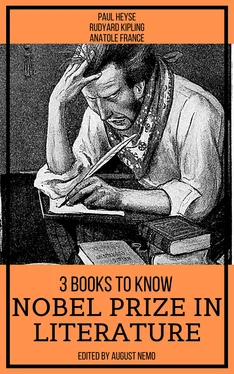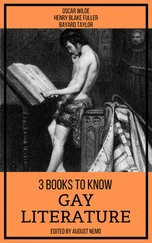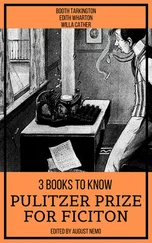In his circumstances there was no outward improvement; his sons grew up, and no promotion or increase of salary could be thought of. But nevertheless their happiness increased, and their stock of youth, love, and romance seemed to grow greater as the children grew. The mother, who bore the beautiful name of Nanna, would not hear of calling her first-born Fritz or Carl, but gave him the name of Edwin. But the boy himself made no preparations to accommodate himself to the lyrically adorned idyl of his parents. His outward appearance was insignificant and remained so; a tall lad with awkward limbs, which were all the more unmanageable because their master in the upper story was thinking of very different matters than how he ought to move his arms and legs; besides, the boy's mind was fixed upon other things than the fairy tales his mother told him, or any of the elegancies with which she surrounded her child. A thoughtful, analytic mind developed in him at an early age; his mother, for the first time in her life was seriously angry with her dear husband, declaring that the father's horrible calculating of figures had gone to the child's head and entered his blood. She tormented herself a long time in trying to efface this instinctive taste, but was at last forced to relinquish her efforts when the boy went to school and brought home the most brilliant testimonials of his progress; yet a secret vexation still gnawed at her heart, all the more unbanishable as for nine years he remained the only child. At last she gave birth to a second, a boy, who promised to make ample amends for the disappointment caused by the apparently sober, prosaic nature of her oldest son. This child was in every respect the exact image of his mother; beautiful as the day, with rich golden curls; he liked nothing better than to be lulled to sleep with fairy tales, cultivate flowers, and learn little stories by heart. The mother seemed to grow young again in her radiant delight in the possession of this innocent creature, to whom the name of Balder, the God of Spring, appeared to her exactly suited. Any one who had seen her at that time, would scarcely have believed her to be the mother of her older son, the long-legged schoolboy with the grave, prematurely old face; so young and smiling, so untried by life, did she look, that her fair head seemed bathed in perpetual sunlight. But it was only a short spring-time of joy. Balder had not yet commenced to distinguish between poetry and reality, when his mother was suddenly attacked by a violent nervous fever, and after a few days' illness, during which she recognized neither husband nor children, she left them forever.
It was a blow which brought her husband to a state of despair which bordered upon madness. But upon the older boy the event had a strange effect. There was, at first, an outburst of wild, passionate grief, such as, from his steady, quiet temperament, no one would have expected. Now it was evident how passionately he had loved his mother, with a fervor for which he had never found words. Up to the time of the funeral it was impossible to induce him to eat; he pushed away his favorite dishes with loathing, and only a little milk crossed his lips just before he went to bed. When he returned with his father from the churchyard, and, himself like a corpse, saw in his father's face every sign of breaking down under the misery of a happiness so cruelly destroyed, while little Balder gazed in perplexity at him with his dead mother's eyes, a great transformation seemed to take place in the older brother's soul. His convulsed face grew suddenly calm, he pushed from his forehead his thin straight hair, and, going up to his father, said: "We must now see how we can get along without mother. You shall never be dissatisfied with me again." Then he sat down on the floor beside the child, and began to play with him as his mother used to do; a thing to which, hitherto, with all his love for the little one, he had never condescended. Balder stretched out his hands to him, and laughingly prattled on in his merry way. The father seemed to take no notice of anything that was passing around him. Weeks and months elapsed before he even outwardly returned to his old habits.
But even then there was not much gained. The portion of him which had been a calculating-machine faultlessly continued its work, but the human affections were totally destroyed. Had not Edwin, with a prudence wonderful in one so young, managed the affairs of the little household when the old maid servant could not get along alone, everything would have been in confusion. When, during the year after his mother's death, the child had a fall which injured his knee so severely that he remained delicate ever after, the last hope which Edwin had of seeing the father take a firm hold of life vanished. He now showed that he had only existed in the reflected lustre left behind by his beautiful wife in the bright-eyed boy. When those eyes grew dim, he could no longer bear the light of day. Without any special illness, he took to his bed and never rose from it again.
The orphaned children were received by one of their father's relatives, a well-to-do official in Breslau, who had a number of children of his own, and could therefore only give his foster sons a moderate share of care and support. They were sent to board in a teacher's family, and fared no worse than hundreds of other parentless boys. Balder felt the disaster least. He had a charm that everywhere won hearts, and his delicate helplessness did the rest. People did not find it so easy to get along with Edwin. A taciturnity and cool reserve, together with the early superiority of his judgment, made him uncomfortable, and, as it always gave him the appearance of not desiring love, people did not see why they should force it upon him. Besides, among all to whom he owed gratitude, there was not a single person to whom he desired to be bound by any closer ties. Thus his little brother remained the sole object of his affectionate anxiety, and it was touching to see how closely, during his play hours, he kept him by his side, spending his scanty stock of pocket-money solely for his pleasure, and shortening his hours of sleep that he might devote his entire afternoon to the sickly child.
Years elapsed. When Edwin went to the university, for despite his poverty and the burning desire for independence, he could not make up his mind to begin any practical business, Balder was about eight years old. He had been unable to go to school on account of his feeble health, as his knee required constant care, and he could not have borne to sit on the school-room benches. But notwithstanding this, he was far in advance of most boys of his age, for he had had Edwin for a teacher, who, by a far more rapid method than that of the schools, had always pointed out the essential part of every lesson, and encouraged him above all to develope his own powers. He succeeded in doing so most wonderfully, without brushing from the boy's soul the bloom of the enthusiasm inherited from their mother. His nature was utterly unlike his brother's; instead of the keen dialectics with which Edwin broke a path into the world of ideas, as a colonist uproots the primeval forest with his axe, Balder's spirit rose aloft as if on wings, and soaring above all intervening tree-tops, he found himself unwearied on the very spot his brother had pointed out in the distance. It was the same in everything connected with school wisdom, as in the mysteries life gave him to solve in regard to men and circumstances. The sure, instantaneous perception, the prophetic power we have described in his mother, seemed born anew in him, and gave the beautiful face, framed in his thick fair hair, and showing few traces of pain, a peculiar and irresistibly winning expression. Besides, he was so kind-hearted, so self-sacrificing, traits doubly rare in chronic invalids, in whom anxiety about themselves becomes at last the sole interest, and almost a sort of sacred duty. He was never heard to complain, and it really did not seem to be a victory of resignation or heroism which he obtained over himself, but rather a natural faculty of his soul to look upon his sufferings and deprivations as a possession from which the greatest gain must be derived, the only innocent speculation, and one for which he had cultivated a masterly aptitude.
Читать дальше












